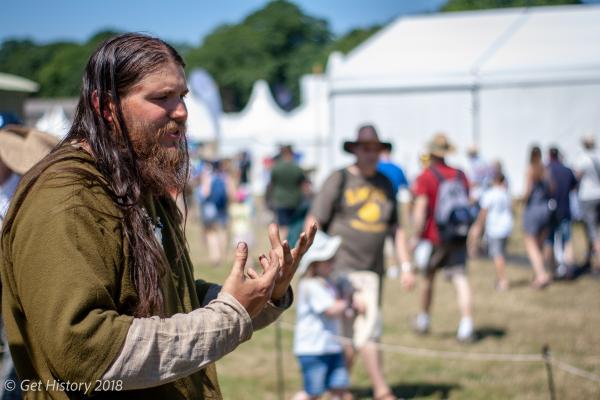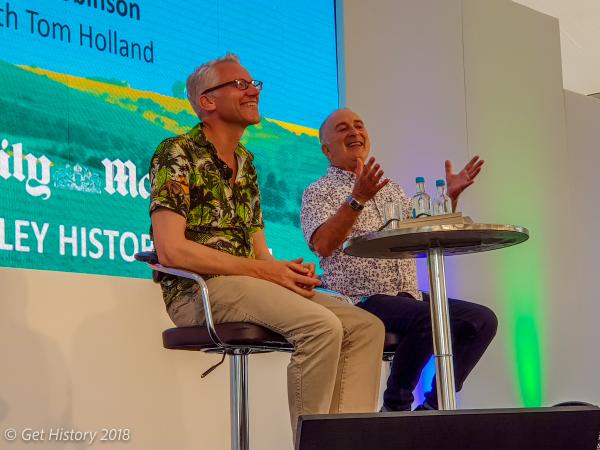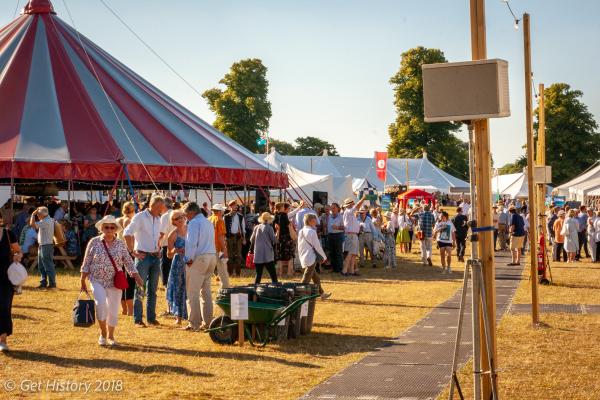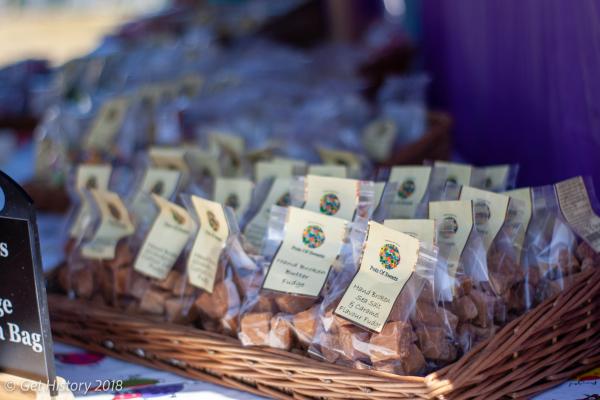In the final week of June 2018, cannon fire rocked the valleys around Broad Chalke, Wiltshire, while fighter planes and bombers flew overhead in dazzling displays of skill. Soldiers responded to calls to arms, flashing their weapons in the bright sunlight, and tanks and other military vehicles rolled into the field. But this was not war, and nor was it the army practising manoeuvres. It was the Chalke Valley History Festival celebrating its eighth year in style.
The Chalke Valley History Festival started life in 2011 as a fundraiser for the local cricket club. Intending only to be a one-off, it proved so popular that the organisers repeated the event the following year and every year since, growing the festival in size and ambition. In 2013, the Daily Mail became its main sponsor and in 2017, it moved to a larger, 70-acre site. It is now the largest festival dedicated to history in the UK. Yet it has not lost its community spirit and ethos: since 2012 all proceeds have gone to the Chalke Valley History Trust, which promotes the study of history, especially to young people. It also runs the History Festival for Schools, delivering an interactive programme specifically designed for school children, which this year reached 2,500 students.

It is hardly surprising, then, that the festival is a favourite with families, providing plenty of activities designed with them in mind. In 2018 these included a sword school, training the young and the young-at-heart to hit each other skilfully with pointy sticks; a First World War trench experience, dug into the valley by a team of volunteers; and a children's activity tent, providing one-hour slots of creative themed 'babysitting', letting children make camouflage helmets, First World War model aeroplanes, and Celtic swords, while the adults attended talks or enjoyed some quiet time. All had to be booked and paid for in advance, but there was also much to do that was included in the entrance price (£35 for a pre-booked family ticket, or free with an event/talk ticket).

Packed into this usually-quiet valley (when it's not haunted by the ghost of a Roman legionary) are living history camps, covering everything from the pre-Romano-British to the Second World War. Almost all of the re-enactors, although melting in the sweltering sun (full marks for wearing layers of woollen clothing and staying cheerful in the 30˚C heat; the only people who looked anywhere close to comfortable were the scantily-dressed gladiators), were engaged and engaging, providing informative demonstrations and displays. Much of their equipment was ‘hands on’, allowing the curious to handle replica weapons, clothing, and medical items. This was supplemented by the new 'Live History Live' interactive talks, with historians such as Tom Holland and Dan Jones interviewing enthusiasts to discover more about the day-to-day lives of our ancestors. Obviously, the success of these talks depended more on the re-enactors - some of whom were perhaps daunted by the size of the watching crowds - than on the speakers, but most relaxed quickly thanks to the supportive audiences. Elsewhere around the site were the staple 'Pop-Up' talks, which were free, and more informal and intimate than those in the 500-capacity main tents. Stories by the History Tellers completed the complement of free and interesting talks. Housed in their own Old Curiosity Shop-themed marquee, the comic narrators told their weird and wonderful tales from history: of deep sea divers and sunken subs, of knee-high cavaliers, and of the brave and foolish on Mount Everest.

2018 also provided a treat for fans of Terry Pratchett, with the recreation of his 'Shed of Doom', constructed on Paul Kidby's designs and displaying the transplanted office of the legendary Discworld author, as well as original artwork by his illustrator. The Chalke Valley History team have made it their mission to 'inspire, excite and inform', and their move to attract new potential history geeks is one of the things that makes the festival great. While only loosely historical, the Shed of Doom became a successful part of the festival's attempt to reach a wider and more varied audience, drawing crowds throughout the week. Those who had never experienced Pratchett were introduced to a whole new world, while those who had previously considered history a dry, dull subject discovered its excitement. The Pratchett theme continued through a range of talks, including Kidby on the art of the Discworld and a display by the only Roundworld members of the Conjurors’ Guild of Ankh-Morpork, Morgan and West. This magical comedy duo of Penn and Teller Fool Us fame are trained teachers, so their performance was not only witty and fun, but excellent for children.
Nor was this the only child-friendly talk on offer over the weekend. A total of six were arranged specifically for children, each spanning an hour. The quality of a speech can often be gauged by the fidgeting of the audience, and an hour-long talk might be considered too much for most children to bear. Not so at these events: the children were as polite and engaged as the adults. The speakers, armed with visual aids and the occasional piece of fine acting talent, were aware of their audience and responded to it, asking questions and explaining difficult concepts. Tom Holland continued his legends of King Arthur series with a surprisingly-clean rendition of the tale of Sir Lancelot; Charlie Higson, comedian and children's author, disgusted and amused with a history of disease from the Black Death to the zombie apocalypse; the children’s author Michael Morpurgo moved and amazed with the true story of his uncles in the Second World War.

Not just the children’s talks, but the whole programme was impressive. The festival was once accused of lacking in diversity, but there was no sign of it this year, with talks covering everything from dinosaurs to hippies, and from China's war with Japan to the founding of America. It included many well-known faces, both from the history circuit - Dan Snow, Simon Schama, and Helen Castor for example - and from the wider world, such as Tony Robinson and Michael Gove. Nor was it afraid to tackle difficult subjects: Brexit, as well as having several of its own discussions, featured in almost every talk I attended; the panel for 'Patterns of the Past' discussed Trump's America and the role of women in politics; Shiraz Maher considered the ideology of Salafi-Jihadism; and Jacob Rees-Mogg answered difficult questions about history and politics from Channel 4's former political producer Tim Bouverie. All of this was interspersed with the more usual, yet still fascinating, subjects of Elizabeth I, Charles I, the Nazi war machine, and medieval chivalry. Many of the speakers are historical heavyweights, university professors, and award-winning authors. They also all share a passion not just for their subject, but for communicating it effectively, and this comes across when they speak. If Chalke Valley History Festival aims to inspire, then their choice of speakers goes a considerable way towards fulfilling the ambition.

A highlight of every festival weekend is the aerial displays of Second World War fighters and bombers, and this weekend was no exception, with two Spitfires and a Lancaster bomber among others. The displays ran frequently throughout Saturday and Sunday, performing loud and breath-taking fly-bys and acrobatic performances in the perfectly clear blue sky. The military theme was continued by the 1940s fancy dress party on the Saturday night, with live music from the D-Day Darlings (as seen on Britain’s Got Talent) and period dancing, followed by a spectacular firework display. The festival's very reasonably-priced outdoor bar was open throughout the party and every day, serving interesting drinks from the local area and across the world. To make the price of drinks even keener, and to aid recycling and the site’s cleanliness, £1 of the drink price was returned when the plastic glass was returned to the bar. I am (un)fortunate enough to attend many festivals and events throughout the year, and the Chalke Valley History Festival is undoubtedly the best in any field. Even after the party, the staff and festival-goers were friendly and civilised; the atmosphere was welcoming and safe; and the site was spotless.

The bar was not the only place to spend money. Sixteen separate stalls provided food to suit any taste, from pizza made in a traditional wood oven to Indian curries and Goan fish burgers, while formal three-course dining was available in the Trethowans marquee. Other stalls sold everything from delicious fudge to dinosaur teeth, and from books from Waterstones to much-welcome sunhats. Perhaps I was encouraged to spend a bit too much money - the food was exceptional, and with so many authors signing books in the Waterstones tent it would be rude not to spend money there - but both the talks and the extras were worth every penny, and I never felt ripped off.
Most festivals struggle to do everything right: they will excel in one area but fall sadly short in others. Chalke Valley History Festival, however, succeeds in being a master of all trades. For those with families, there is enough to engage and enthral children and adults of all ages; for the avid history fan there is a multitude of riveting talks from well-respected authors to choose from. And here is the main problem with the festival: there is simply too much to do, and too many hard choices to be made. We could have spent twice the time there and still come away wanting more. However, this makes one decision simple: to put the dates for the 2019 festival (24-30 June) in our calendar now!
You can find out more about the Chalke Valley History Festival by visiting them at www.cvhf.org.uk.

